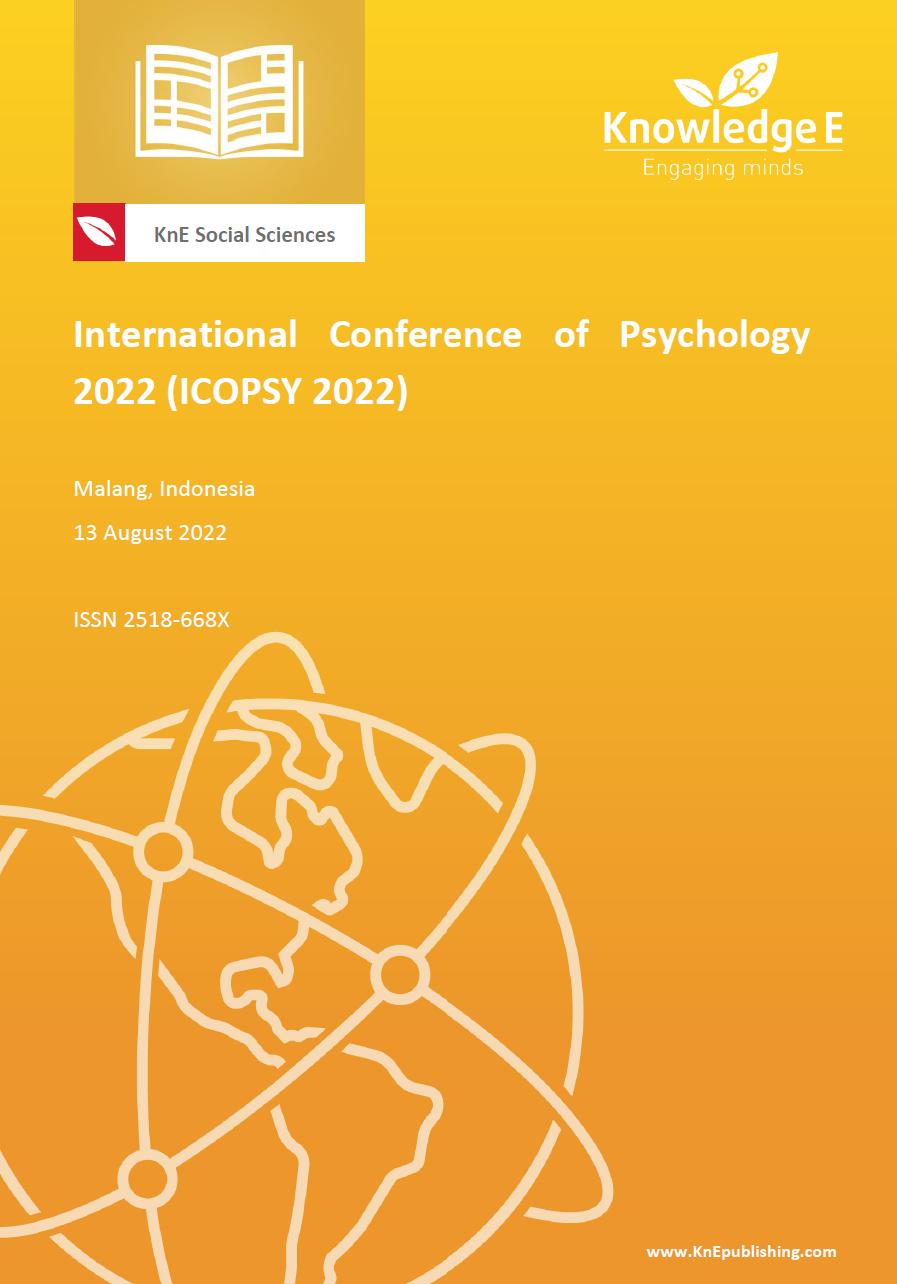Relationship Between Self-esteem and Negative Perception Trends About the Body in Early Adults at STIKES Maharani Malang
DOI:
https://doi.org/10.18502/kss.v7i18.12391Abstract
This study aims to examine the relationship between self-esteem and the tendency of negative perceptions about the body in early adulthood at STIKES Maharani Malang. This study uses a quantitative approach with a descriptive correlational method. The study amounted 98 female students at STIKES Maharani Malang by using the Purposive Sampling Technique as a sample determinant. The data analysis technique used is the Pearson Product Moment correlation test. Data collection uses an adaptation of the State self-esteem (SSES) by Heatherton and Polivy [1] and a modified Body Dysmorphic Disorder Symptom Scale (BDD-SS) by Wilhelm et al. [2]. The results of hypothesis testing using Spearman Rank correlation with a value of Sig .00 (P < .05), because in the assumption test the data is not normally distributed. The results of the analysis show that there is a positive relationship between self-esteem and the tendency of negative perceptions about the body.
Keywords: self-esteem, negative perception tendencies, early adulthood
References
[2] Wilhelm S, Greenberg JL, Rosenfield E, Kasarskis I, Blashill AJ. The body dysmorphic disorder symptom scale: Development and preliminary validation of a self-report scale of symptom specific dysfuction. Body Image. 2016;17:82-87. https://doi.org/10.1016/j.bodyim.2016.02.006
[3] Asosiasi Penyelenggara Jasa Internet Indonesia. Hasil survei internet APJII 2019- 2020-Q2. 2020. https://apjii.or.id/content/read/39/521/Hasil-Survei-Internet-APJII- 2019-2020-Q2
[4] Natari DAM. Studi deskriptif mengenai body image pada wanita usia dewasa awal yang aktif menggunakan media sosial di Kota Bandung [Skripsi, Universitas Islam Bandung]. Universitas Islam Bandung Repository; 2016. http://repository.unisba.ac.id/handle/123456789/4250
[5] Lestari S. Distorsi kognitif penderita Gangguan Dismorfik Tubuh (BDD) [Doctoral Dissertation, Universitas Airlangga]. Surabaya: Universitas Airlangga Repository; 2018. https://repository.unair.ac.id/70735/
[6] Cash TF, Pruzinsky T. Body image: A handbook of theory, research, and clinical practice. New York: Guilford Publications; 2012.
[7] Diana NN. Hubungan self esteem dan self acceptance dengan body dysmorphic disorder pada mahasiswi [Skripsi, Universitas Islam Negeri Maulana Malik Ibrahim). 2019. http://etheses.uin-malang.ac.id/15413/
[8] Hurlock EB. Development psychology: A life-span approach. New York: McGraw-Hill, Companies, Inc; 1980.
[9] Santrock JW. Life-span development: Perkembangan masa hidup. 13th ed. In: Sallama NI editor. Jakarta: Erlangga; 2012.
[10] Widodo AS, Pratitis NT. Harga diri dan interaksi social ditunjau dari status ekonomi orangtua. Persona, Jurnal Psikologi Indonesia. 2013;2(2):131-138. https://doi.org/10.30996/persona.v2i2.100
[11] Veale D, Neziroglu F. Body dysmorphic disorder: A treatment manual. Wiley- Blackwell; 2010. https://doi.org/10.1002/9780470684610
[12] Edmawati MD, Hambali IM, Hidayah N. Keefektifan konseling kelompok dengan teknik cognitive restructuring untuk mereduksi body dysmorphic disorder. Jurnal Pendidikan: Teori, Penelitian, Dan Pengembangan. 2018;3(8):1076-1079.
[13] Oktaviana R. Hubungan antara self-esteem dengan kecenderungan body dysmorphic disorder pada siswa YPAC Palembang. Jurnal Ilmiah PSYCHE. 2013;7(2):53-62.
[14] Rahmania PN, Ika YC. Hubungan antara self-esteem dengan kecenderungan body dysmorphic disorder pada remaja putri. Jurnal Psikologi Klinis dan Kesehatan Mental. 2012;1(2):110-117.
[15] Pop CL. Self esteem and body image perception in a sample of University Students. Eurasian Journal of Educational Research. 2016;16(64):31-44. https://doi.org/10.14689/ejer.2016.64.2
[16] Woolley AJ, Perry JD. Body dysmorphic disorder: Prevalence and outcomes in an oculofacial plastic surgery practice. American Journal of Ophthalmology. 2015;159(6):1058-1064. https://doi.org/10.1016/j.ajo.2015.02.014
[17] Challis S. Understanding psychosis. London: National Association For Mental Health; 2013. https://www.nimh.nih.gov/health/publications/understanding-psychosis
[18] Phillips KA. Body dysmorphic disorder: Clinical aspects and relationship to obsessive-compulsive disorder. Clinical Synthesis. 2015;13(2):162-174. https://doi.org/10.1176/appi.focus.130205
[19] Sari D. Hubungan antara body image dan self esteem pada dewasa awal tuna daksa. Calyptra: Jurnal Ilmiah Mahasiswa Universitas Surabaya. 2012;1(1).
[20] Baumeister RF, Vohs KD. Self-regulation and the executive function of the self. In Leary MR, Tangney JP, editors. Handbook of self and identity. The Guilford Press; 2003.
[21] Defrian MA. Pengungkapan diri ditinjau dari harga diri dan jenis kelamin pada mahasiswa psikologi UIN Suska Riau (Skripsi, Universitas Islam Negeri Sultan Syarif Kasim Riau). Repository UIN Suska. 2015. http://repository.uinsuska. ac.id/6709/1/fm.pdf
[22] Gaucher D, Wood JV, Stinson DA, Forest AL, Holmes JG, Logel C. Perceived regard explains self-esteem differences in expressivity. Personality and Social Psychology Bulletin. 2012;38(9):1144-1156. https://doi.org/10.1177/0146167212445790
[23] Reber AS, Reber ES. Kamus psikologi. Yogyakarta: Pustaka Pelajar; 2010.
[24] Baron RA, Byrne D. Psikologi Sosial Jilid 1. 10th ed. Jakarta: Erlangga; 2004.
[25] Prawesti FS, Dewi DK. Self esteem and self disclosure pada mahasiswa psikologi pengguna blackberry messenger. Jurnal Psikologi Teori dan Terapan. 2016;7(1):1-8. https://doi.org/10.26740/jptt.v7n1.p1-8
[26] Raharja DW, Yuniardi MS. Self-esteem dan kecenderungan body dysmorphic disorder pada mahasiswi. Psycho Holistic. 2019;1(1):23-29.
[27] Syah M. Psikologi pendidikan dengan pendekatan baru. Bandung: Remaja Rosdakarya; 2010.
[28] Nurvita V, Handayani MM. Hubungan antara self-esteem dengan body image pada remaja awal yang mengalami obesitas. Jurnal Psikologi Klinis dan Kesehatan Masyarakat. 2015;4(1):41-49.
[29] Artika D. Hubungan antara self esteem dengan kecenderungan body dysmorphic disorder pada dewasa awal di kota Malang [Skripsi, Universitas Negeri Malang]. Repository Universitas Negeri Malang. 2021. http://repository.um.ac.id/196580/
[30] Phillips KA, Pinto A, Jain S. Self esteem in body dysmorphic disorder. Body Image. 2004;1(4):385-390. https://doi.org/10.1016/j.bodyim.2004.07.001
[31] Branden N. Kiat jitu meningkatkan harga diri. Jakarta: Delapratasa; 2010.
[32] Mruk CJ. Self-esteem research, theory, and practice: Toward a positive psychology of self-esteem. 3rd ed. New York: Springer Publishing Company; 2006.v

